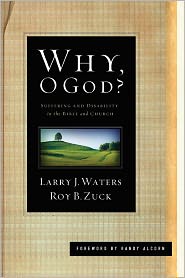 I have never said yes to endorsing a book, much less to writing its foreword, unless I believed in it. I anticipated Why, O God?: Suffering and Disability in the Bible and the Church, edited by Larry Waters and Roy Zuck, would be good, but I am pleased to find it exceptional.
I have never said yes to endorsing a book, much less to writing its foreword, unless I believed in it. I anticipated Why, O God?: Suffering and Disability in the Bible and the Church, edited by Larry Waters and Roy Zuck, would be good, but I am pleased to find it exceptional.
Let me offer some context. Because I’ve written books about Heaven, over the years I’ve received hundreds of letters from people whose loved ones have died, after extended periods of suffering. While researching my recent book If God Is Good, I read close to 100 books on the problem of evil and suffering—by theologians, pastors, physicians, Holocaust survivors and atheists. I interviewed many sufferers, some of them victims of abuse, diseases, disabilities and accidents, others who’ve lost children and spouses.
This is why I don’t appreciate neat, tidy and superficial references to suffering that seem to say “Cheer up,” and “God will protect his children from suffering,” and “It’s not so bad, if you’re a Christian.” Actually, it’s sometimes very bad. As our dear friend Joni Eareckson Tada—one of this book’s contributors—told me, “Suffering is a messy business.”
Why, O God? addresses issues in the Bible, theology, church and pastoral ministry, counseling and much more. Each chapter makes a unique contribution, and the whole is greater than the sum of its parts. Rarely have I seen biblical and theological knowledge integrated with moving and helpful personal stories and extremely practical ministry guidance. And as a bonus, I enjoyed the beautiful art.
There’s something in this book for everyone—whether you’re looking for biblical perspective on suffering, insights on how to serve those who suffer, hands-on guidance in establishing a disability ministry in your church, or how to deal with the ethical questions in end-of-life issues.
I particularly appreciate the fact that the writers are not strangers to suffering. These are not ivory tower theologians, out of touch academics or head-in-the-sand clerics. These are real people in touch with real people, daily serving a God who shed real blood on a cross.
One of the things I love about Why, O God? is how it demonstrates there is much more to helping suffering people than wheeling them forward in healing services, then hiding in the back of the church those who aren’t healed. My friend John, a church elder, told me of a handicapped woman visiting his church, who had been in many other churches over her lifetime. After observing him on the platform in his wheelchair with the other elders, she told him he was the first disabled church leader she had ever seen.
My mind goes to one of the stories in Why, O God?, about six men in a church being trained to take care of a disabled man in eight hour shifts, in order to free his wife to attend a weekend women’s retreat. Everyone came out ahead—the man, his wife, the men who served, and the Lord who took pleasure in it. This is the church at its best—not denying suffering or ignoring it or cloaking it, but bringing to it the love of our suffering Savior. An uncaring world will never be won to Christ by an uncaring church. But when people see the church behaving like this, they will line up to find out about the Christ we serve.
Finally, I appreciate this book’s eternal perspective. Christians are empowered by God’s Spirit, covered by his grace and assured of the resurrection to the happiest life imaginable on a New Earth. We should never forget this, and it can sustain us through great heartache. But meanwhile we are not immune to the fall and the curse. Only when we fully realize this can we see the loving power of God’s sovereign grace. Because even the very bad, in the hands of our Redeemer who turned history’s worst Friday into Good Friday, is part of the “all things” God will ultimately work together for our good.
My thanks to each of the authors, and also to Larry Waters and Roy Zuck for assembling this excellent book. May it bring honor to the risen Christ, and enrichment to his people.
Until the day we see His outstretched hands, marked by the scars of His love for us,
Randy





